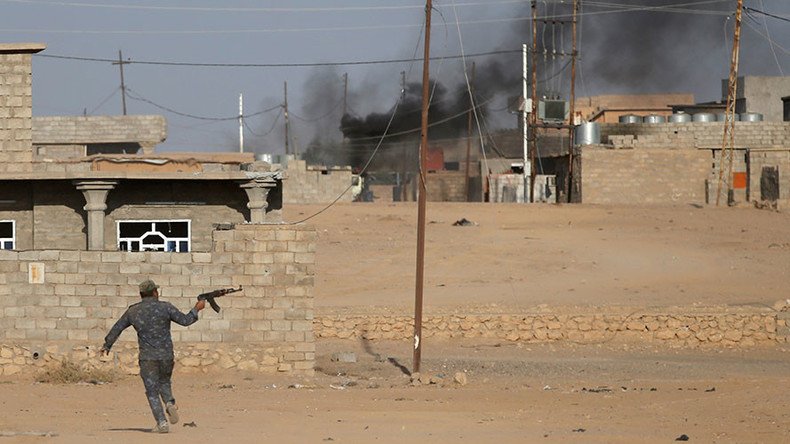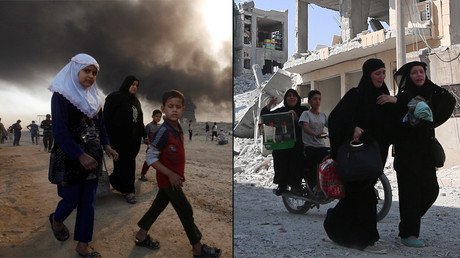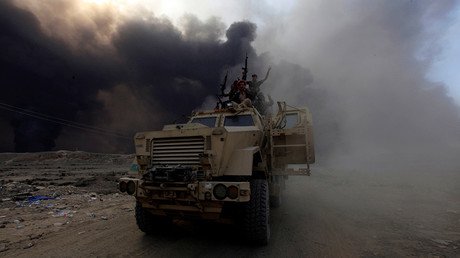US double standards: '1mn people of Mosul have no chance of escape, no humanitarian truce'

The Americans have prevented any deal, any coordination with the Russians in ways to fight ISIS in Syria and in Iraq, and that is puzzling Damascus-based journalist Ziad Haidar told RT.
The Syrian city of Aleppo is witnessing some of its fiercest fighting since the conflict began there over four years ago. A cessation in fighting for humanitarian relief was announced by Russia. The rebels are taking advantage of the ceasefire, however, to begin an offensive on the government-held western section of the heavily contested city.
The Syrian army has responded to the attacks, which is forcing many civilians to flee their homes.
Meanwhile, US State Department spokesman John Kirby has called it "inappropriate" to compare the war zones in the Syrian city of Aleppo and Mosul in Iraq.
Asked about how the situation in Aleppo is different from what is happening in Mosul, Kirby said: “It is radically different, and I've seen comments by the Russian Foreign Ministry, I think from Minister Lavrov in particular about how it's the same. And it's absolutely not the same. And to compare the two is frankly insulting.“
RT interviewed Damascus-based journalist Ziad Haidar, and Adel Darwish, Middle East expert for their views on Kirby's comments, as well as the overall situation in the battlezones.
RT: The two separate military operations in Mosul and Aleppo, the former being led by the US, the latter by the Russians, are being widely compared as both seem to have the same objective, which is to defeat terrorists who are using civilians as human shields. So why is the US claiming there's a big difference?
Ziad Haidar: It is the usual US policy. They see things in their own interest and when it comes to others doing similar business, they see it differently. We see what’s happening in Mosul is not much different to what’s happening in Aleppo. Although, in Aleppo the Russians and the Syrians managed to open three passages for civilians to leave the eastern part of Aleppo in a truce that has been lasting now for two weeks and they opened two passages for the rebels, especially the ones that are affiliated with Al-Qaeda and Jabhat Al-Nusra to leave as well and to prevent an escalation of the situation in Aleppo. While in Mosul we haven’t seen the same process.
In Aleppo, there are around 94,000 civilians trapped in eastern Aleppo. I know that there are others that say there are 200,000, but the Syrian officials say it is around 100,000 civilians. While in Mosul there are one million civilians trapped and there are no passages for them to leave, there are no talks about any sort of truce or deals that could prevent the possibility of civilians getting killed. So, in a way it is the usual double standard that American policy has in the region which we quite know and are used to.
RT: Why do you think the US is so eager to avoid any comparisons?
ZH: I think we all know. Because it is their policy in Iraq, while it is the Russian policy in Syria. Because the Russian policy in Syria doesn’t fit with their interests. That is the only reason I could think of. Actually, the Americans have prevented any deal, any coordination with Russians in matters to fight ISIS in Syria and in Iraq. I find it actually puzzling to see that the Americans are so willing to do business with the Iraqis and other 66 states in the matter to fight ISIS. But on the same level, when it comes to fighting ISIS or Al-Qaeda in Syria they are not ready to coordinate with the Russians, they are not ready to coordinate with the Syrians; they are not ready even to talk about any sort of red channels of communications to prevent the interests of both sides conflicting. This is the American policy in the region. But this has not prevented the Syrians and the Russians from implementing their own policy (...)
"I think John Kirby, like Secretary Kerry, are living in an alternative universe on this fight. The US was invited into Iraq, but was not invited into Syria. What is basically the same is that we are fighting jihadi-salafist groups. And a comedy nominator in both areas is Turkey, which is flexing its influence at this point, wanting to take over, so I think that they are both the same, we got similar enemies. There might be some different circumstances in alignment of the groups, but bottom line is it is all the same. And the US is acting, particularly in Syria, in a way that is totally illegal. And again the commonality in both is that there is a heavy toll of civilian casualties resulting in a humanitarian crisis in both areas." - former Pentagon official Michael Maloof
RT: Operations in Mosul and Aleppo are being widely compared - both seem to have the same objective - to defeat terrorists who are using civilians as human shields. Why is the US claiming there's a big difference between the two operations?
Adel Darwish, Middle East expert: I think it was an unwise comment on the part of State Department spokesman John Kirby. Because there is a similarity, and it is geographical. One is in Iraq, one is in Syria. And what is in their mind. I think in the overall picture, if the world is to fight terrorism, if it wants to secure the release of civilians and restore stability, then all the parties have to cooperate and acknowledge reality on the ground, not just try to score points and rerun the Cold War. And I think that is what seems to be in the mind of the State Department spokesman, rather than seeing reality on the ground.
RT: When we hear these vindictive barbs coming from the Americans toward Russia for the airstrikes on East Aleppo, do you believe the Coalition forces will be able to avoid large civilian casualties in Mosul?
AD: There are two points, here. One, it doesn't matter how careful you are, mistakes will always be made. Any civilian casualties are deplorable (...) but once you start throwing bricks at other people, then you are living in a glass house. The second point is that the Americans don't seem to know what is actually happening on the ground because I don't think they really understand the situation. Staffan de Mistura, United Nations special envoy for the Syria crisis, a couple of weeks ago was actually offering a safe passage to jihadist rebels of Jabhat Fateh Al-Sham (formerly Al-Nusra Front), which is holding civilians as ransom (...) but they haven't separated them, so I don't know what is worse: The US turning a blind eye, or they really don't know what is going on. I think it is more the case of the latter, and that is very dangerous if you really don't know what is happening on the ground.
The statements, views and opinions expressed in this column are solely those of the author and do not necessarily represent those of RT.














